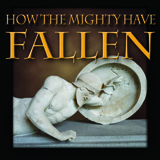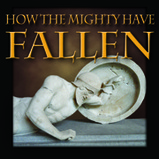 This is an excerpt from chapter four of "How The Mighty Have Fallen." Follow this link to order your copy. He was the most revered and powerful man in Israel. An entire army obeyed his command. No one compared in status, wealth, and respectability. Yet, by his own admission, Saul “feared the people.” As a result of this condition, God deemed the king unfit for leadership and prophesied the removal of his authority. The lesson is clear: in the Kingdom of God it is impossible to lead people when you are afraid of them. God gave King Saul a clear vision of His will. The Amalekites were to be utterly destroyed as retribution for their mistreatment of Israel years before. Man and beast, woman and child, none were to survive. Apparently, en route to battle, someone had an idea: “Let’s save the plunder, sheep and oxen, and offer them as a sacrifice to God in Gilgal. And while we’re at it, let’s spare King Agag; he seems like a nice enough fellow and could be a good friend to us.” The idea had wide appeal and general consensus determined that destroying“everything” was unnecessary. The result was a new vision—one more suited to the preferences of the people. The essence of leadership is to confront status quo and pull the people to “the place they ought to be.” It often requires the leader to challenge unhealthy cultural norms in the face of disagreement and strong resistance. Although he may be misunderstood, maligned, and even mistreated, it is in those times the leader simply must lead! This is exactly what Saul could not do and what disqualified him from leadership. He feared the people, consented to their rebellion, and permitted Agag to live. Samuel would soon teach him that to condone wrong behavior, even tacitly, is to bear as much blame as those who commit the evil blatantly. The nature of leadership is to stand out in front and call others to a higher place, but this spirit causes leaders to lag behind with apathy and malaise. When they should be pointing the way, challenging the prevailing attitudes of mediocrity, this spirit induces leaders to sit idly on the sidelines with hands in pocket blending into the background of status quo. Leadership is not just having a title. It’s more than sitting on a committee. Leadership is about movement and change and influencing people toward a certain direction. To lead is to be in the “place” God wants for His people and then “pull” people into that place by the power of one’s own passion. It is having such an effect on people that they take ownership of the same attitudes, values, and convictions of the one leading them. Sadly, many believe that because they have a respected title or attend meetings that they function as a leader. They are mistaken. Pastors who fill churches but fail to produce cross-carrying disciples are not leading. Trustees who manage a place of worship but do not show people how to worship in that place are not leading. Deacons who affirm their belief in prayer but do not attend prayer meetings are not leading. Elders who “amen” their agreement with the concept of holiness but do not openly demonstrate repentance and display a passion for personal purity are not leading. Leaders are“first.” They do not wait for an invitation or rely on encouragement from their peers. They lead. Leaders are the first ones to sacrifice, the first ones to give, the first to pray, worship, repent, and weep over sin. They are the first to serve, the first to shout “amen” and the first to the altar for deeper consecration. Leaders constantly look behind at the ranks that follow and challenge complacency by the force of their own example. They do not wait for someone else to determine the environment. They decide how the environment should be and set out to change it. Culture is every leader’s battlefield, status quo is the enemy and victory is decided by the transformational results of their influence. True leadership can be likened to a thermostat regulating the temperature of a room. If the spiritual climate of a house grows cold, the leader turns up the heat by the intensity of his own passion and converts the environment to his own character. On the other hand, leaders having gone the way of Saul are more like thermometers. Instead of influencing the environment, they are influenced by it and conform to it. When watching the character of a Saul, one will not see a passionate example of where God is calling His body to; instead, one will see a mere reflection of the tired lukewarmness that has gripped the community and is destroying it. It’s time to confront the spirit of Saul in the church today. It’s time to slay the Agags and slaughter the sheep and lead the people into full obedience of the Word of God. Will some people reject this standard? Certainly! Will some people leave and find another king to follow? You can count on it. But the people who stay will be those who are serious. There may only be twelve of them. But with twelve disciples, sold out for Christ, you can turn the world upside down!  “Those who have been once intoxicated with power, and have derived any kind of emolument from it, never can willingly abandon it.” - Edmund Burke Saul was obsessed with establishing his greatness. But the price of his ambition was the abuse of the people he was called to serve. He wanted a dynasty, an empire that would stand for ages to come. He wanted a name that all the earth would adore and revere. But to do this, he exploited his people. He forbade them from eating, resting, or tending to their own needs until his victory was sure. In fact, he pronounced a curse upon any who refused to cooperate. It mattered not how distressed, fatigued, or hungry they were. All that mattered was his ambition. Driven by a perverted vision of greatness, Saul believed that Israel existed to serve him rather than him for it. Instead of esteeming the people as a trust God had given him to shepherd and protect, he saw them as things to use to fulfill his own lust for success. Sadly, the same self-serving spirit that drove King Saul is a force growing more common in the body of Christ: Christian leaders using their office, not to glorify God or edify His people, but to promote themselves. At first glance it appears their cause is noble. They seem to be serving people and advancing the Kingdom of God; but closer examination reveals something different. There is a subtle tendency to manipulate others, to control and use them like objects to advance the leader’s ambition. Corruption is the abuse of public office or position for private gain. It is when something good turns bad. It is when good leaders, who begin with noble intentions, become enticed and corrupted by selfish opportunities. They cease to use their authority to serve the public good and, instead, use their position to better themselves, solicit favors, amass wealth, promote friends and family, and leverage power to themselves. This is what happened to Saul. He used his authority as a means to achieve his own ambitions. There is no greater protection a leader has against corruption than the heart of a servant. This is one reason why Jesus made it a prerequisite for leaders in the Kingdom of God. He knew that in a very short time, after His ascension and the outpouring of the Holy Spirit, thousands would be saved and the disciples would be given charge over large sums of money. Acts 4 tells how “…all who were possessors of lands or houses sold them, and brought the proceeds of the things that were sold, and laid them at the apostles' feet; and they distributed to each as anyone had need” (Acts 4:34-35). Clearly, because the apostles saw themselves as servants of the people, they were able to distribute these assets without acting like Judas who was a “‘thief’…and used to take what was put in the money bag for his own use” (John 12:6). Leadership is a trust given to us by those we lead. Never should it be used for one’s own benefit or personal advancement. That would be an abuse of one’s authority. Every decision, action, and reaction should be meant for the advancement and betterment of those we serve and the organization we represent. If one aspires to leadership out of a desire for power, recognition, or control, he or she is aspiring for the wrong reason. Our ministry will be polluted with impure motives and defiled by worldly ambition. What’s worse is it will be void of God’s blessing and will actually draw down His curse. James 4:6 says, “God resists the proud.” Proverbs 16:18 tell us that “Pride goes before destruction, and a haughty spirit before a fall.” Self promotion provokes God to move against us and pull our ministry down. Humility, on the other hand, invokes God’s blessing and rich provision. |
Archives
February 2023
Categories
All
It was concerning King Saul that David said, “How the mighty have fallen, and the weapons of war perished.” His was a life that began with great promise and celebration, but ended in miserable failure and humiliation. His life is an example of how the mightiest of leaders fail.
Why do great men and women fall? How do leaders, quick to ascend with such promise of unparalleled success, find themselves awash in disastrous failure and disgrace? More importantly, can the path toward one’s downfall be discerned before it’s too late and be avoided? It is the premise of my newest book, How The Mighty Have Fallen that such a decline can be detected and reversed. The life and leadership career of King Saul, Israel's first king, provides us with a treasury of examples of "what not to do." The below blog post is the first in series of excerpts from the book to examine and avoid Saul's mistakes and find a successful path through leadership. READ AN EXCERPT |
all content on this website is ©GreggTJohnson

 RSS Feed
RSS Feed